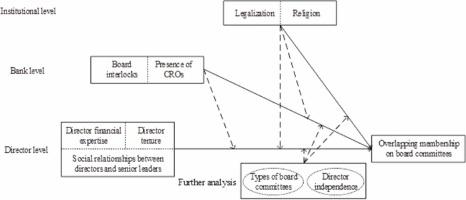The multilevel determinants of overlapping membership on board committees: Evidence from Chinese banks
IF 6.3
2区 经济学
Q1 BUSINESS, FINANCE
Research in International Business and Finance
Pub Date : 2024-10-09
DOI:10.1016/j.ribaf.2024.102612
引用次数: 0
Abstract
This study manually collects data on 4090 board committee members from 36 listed banks in 11 regions of China from 2007 to 2020, uses a hierarchical linear model, and integrates institutional and resource dependence theories to examine the multilevel determinants of overlapping membership on board committees. The results show that lower legalization and the absence of chief risk officers promote overlapping membership on board committees. Directors who have financial expertise, are shorter-tenured, and do not have social relationships with senior leaders sit on more board committees. Further analysis shows that information and resource needs are more likely to drive overlapping membership on board monitoring committees, and independent directors with lower information acquisition costs sit on more board committees. The moderating analysis between multilevel factors shows that legalization and the presence of chief risk officers substitute for, while religion and board interlocks complement director-level information and resource needs.

董事会委员会成员重叠的多层次决定因素:来自中国银行的证据
本研究人工收集了中国 11 个地区 36 家上市银行 2007 年至 2020 年 4090 名董事会委员会成员的数据,采用层次线性模型,结合制度理论和资源依赖理论,考察了董事会委员会成员重叠的多层次决定因素。结果表明,较低的法律化程度和首席风险官的缺失会促进董事会委员会成员的重叠。拥有财务专业知识、任期较短、与高层领导没有社交关系的董事会参加更多的董事会委员会。进一步的分析表明,信息和资源需求更有可能导致董事会监督委员会成员的重叠,而信息获取成本较低的独立董事则会加入更多的董事会委员会。多层次因素之间的调节分析表明,合法化和首席风险官的存在替代了董事层面的信息和资源需求,而宗教和董事会互锁则补充了董事层面的信息和资源需求。
本文章由计算机程序翻译,如有差异,请以英文原文为准。
求助全文
约1分钟内获得全文
求助全文
来源期刊

Research in International Business and Finance
BUSINESS, FINANCE-
CiteScore
11.20
自引率
9.20%
发文量
240
期刊介绍:
Research in International Business and Finance (RIBAF) seeks to consolidate its position as a premier scholarly vehicle of academic finance. The Journal publishes high quality, insightful, well-written papers that explore current and new issues in international finance. Papers that foster dialogue, innovation, and intellectual risk-taking in financial studies; as well as shed light on the interaction between finance and broader societal concerns are particularly appreciated. The Journal welcomes submissions that seek to expand the boundaries of academic finance and otherwise challenge the discipline. Papers studying finance using a variety of methodologies; as well as interdisciplinary studies will be considered for publication. Papers that examine topical issues using extensive international data sets are welcome. Single-country studies can also be considered for publication provided that they develop novel methodological and theoretical approaches or fall within the Journal''s priority themes. It is especially important that single-country studies communicate to the reader why the particular chosen country is especially relevant to the issue being investigated. [...] The scope of topics that are most interesting to RIBAF readers include the following: -Financial markets and institutions -Financial practices and sustainability -The impact of national culture on finance -The impact of formal and informal institutions on finance -Privatizations, public financing, and nonprofit issues in finance -Interdisciplinary financial studies -Finance and international development -International financial crises and regulation -Financialization studies -International financial integration and architecture -Behavioral aspects in finance -Consumer finance -Methodologies and conceptualization issues related to finance
 求助内容:
求助内容: 应助结果提醒方式:
应助结果提醒方式:


